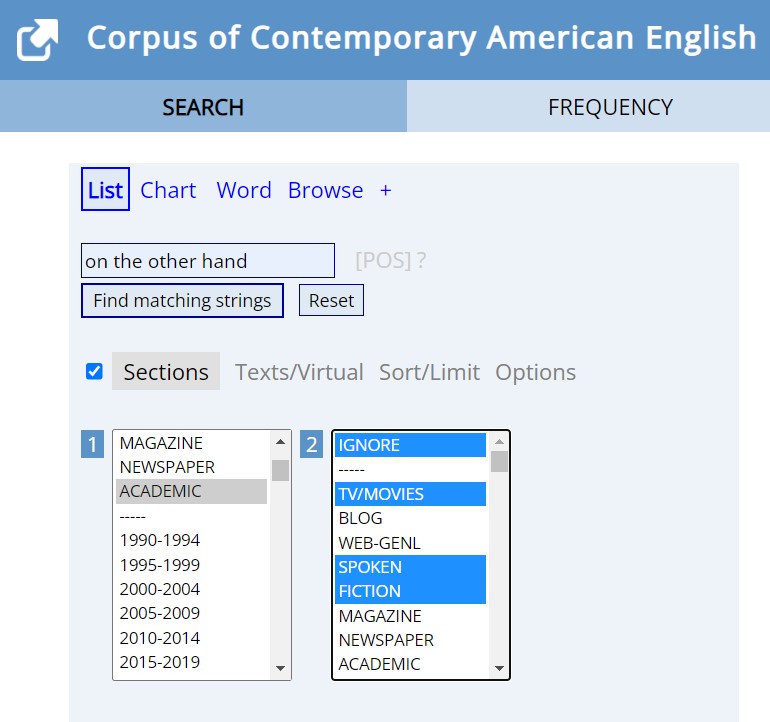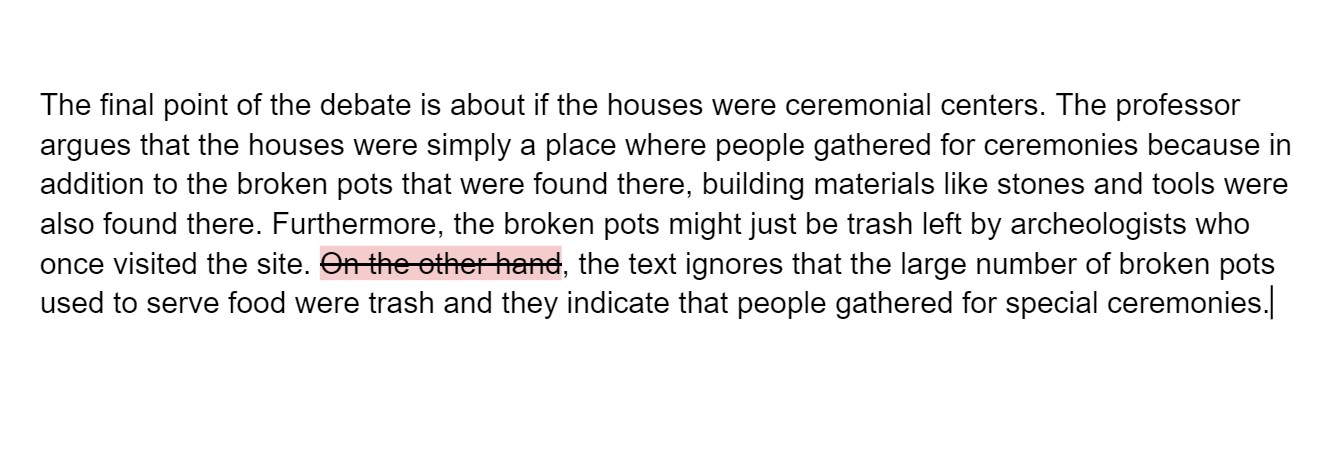For the best comprehension, click to listen and read simultaneously.
I don’t know who first gave you the idea to use “On the other hand” in your Integrated essays for TOEFL iBT — but if your goal is to score 24+ in that section, we need to talk about why you should stop using the phrase.
TOEFL Graders give an advanced score (like 3.75 to 4.0 per essay, which contributes to the overall score of 24/30) when your essay shows a particular combination of advanced features. Vocabulary or “phrasing” is one of those features.
So without further ado, let’s dive into the reasons you need to think twice before typing “on the other hand” for TOEFL Graders to find.
Reason #1: "On the other hand" is used only 25% of the time in formal contexts -- and 75% of the time in casual or informal contexts.
I hope you’re skeptical of my statistic! How do I even know 25% or 75%? Here’s my evidence. There is a database called a “corpus” which essentially lets us search in order to find particular phrases. The corpus not only shows the original sentence but it also counts up the number of entries for each search.
In this kind of discussion, a corpus is much more useful than a dictionary, because the corpus shows popularity. If a phrase or word is used commonly, we’ll see high numbers (like in the thousands). However, if a phrase is rare, you’ll see a low number (like under 100).
As time passes, the corpus grows bigger because it absorbs more and more examples of English from the internet, academic papers, TV shows or movies, etcetera. The numbers below are true for when I’m writing this.
The phrase “On the other hand” shows up in the BYU’s COCA Corpus a total of of 38,328 times — so for sure, and without a doubt, it’s common in English!

But… When do native speakers use “on the other hand?” For this, I’m searching again and I’m pulling only “academic” results and ignoring TV, movies, spoken English and fiction because those are totally different from the style of an Integrated essay on TOEFL iBT.
The picture below shows the results of that search. “On the other hand” comes up just 9,339 times in academic contexts. You do the math. 9,339 is basically just 1/4 (a quarter) of the total, 38,328.

I’m not sure if you can zoom in enough on this picture below. You may need to do the same search in order to see the detail. This image shows how many times “on the other hand” was used in academic situations in 5-year time spans.
But I digress.
The people who design and write every TOEFL iBT test give you the Integrated essay with the main goal of deciding whether or not you can summarize and compare two different academic perspectives on the same topic. They are not asking you to write something casual, like what you did over the weekend or what your favorite hobby is.
The TOEFL Integrated essay purposefully shows you a formal-to-semi-formal academic text and lecture. Then they ask you to summarize it — just like you would do in a university environment. Even though you may be a foreign-educated healthcare professional who needs a score of 24 on Writing to satisfy your licensing requirements, you must remember: The TOEFL iBT Writing is checking your ability to summarize academic information.
For me personally, the fact that “on the other hand” is found so much less frequently in academic contexts is enough of a reason to avoid completely in my TOEFL Integrated essay.
I have registered for TOEFL iBT and I’ve taken it multiple times. (I show you my scores on the ABOUT page of my website, if you’re curious.) I’m saying this with personal experience: I would not spend all that money on test registration fees (which are currently about $200 USD) just to gamble and find out if TOEFL Graders are willing to see this phrase in an academic situation.
I’m happier just using a less risky transition phrase. I assume you don’t want to take the risk either… But in case you do, let’s continue with the next reason.
Reason #2: The subject commonly comes first.
It’s really common when native speakers use “on the other hand” to put it after the subject and before the verb. Look at these examples:
Popular Placement:
Subject, on the other hand, verb object
- She thought the movie was terrible. I, on the other hand, loved it!
- We tried really hard to make it work. My parents, on the other hand, thought we were making excuses.
Less-Popular (but fine) Placement:
On the other hand, subject verb object
- She thought the movie was terrible. On the other hand, I loved it!
- We tried really hard to make it work. On the other hand, my parents thought we were making excuses.
So… if if if if IF (a huge “if” here. I’m not saying “use this on the Integrated essay at TOEFL” … I still don’t think you should, for the record), I’m just saying if… IF you were going to use it on the Integrated essay, your best chance to make “on the other hand” sound like it fits properly is to put the subject first.
But even then, you need to be careful because…
Reason #3: It can't be far from the 'main focus.'
We’re going to review the same examples again and notice 2 things:
(1) what the main focus is
and
(2) how close it is to “on the other hand.”
By the way, “the main focus” is not a technical grammar term. We’re keeping things simple so you quickly understand why so many people limit their TOEFL writing scores.
Example 1 (Natural; Accurate)
She thought the movie was terrible. I, on the other hand, loved it!
What is the main focus?
“the movie / it”
How many words away from the main focus is “on the other hand”?
3 (was terrible. I) In other words, the main focus is VERY CLOSE to “on the other hand”
Example 2 (Natural; Accurate)
We tried really hard to make it work. My parents, on the other hand, thought we were making excuses.
What is the overall concept?
“make it work / making excuses”
How many words away from the main focus is “on the other hand”?
2 (My parents). Again, “on the other hand” is VERY CLOSE to the main focus.
You can search through The Corpus if you want and look at thousands of examples that will show you this same kind of closeness.
For the phrasing to sound natural — and here’s the rule — you cannot write a whole bunch of words between the main focus and “on the other hand.” And that brings us to the common mistake in TOEFL Integrated essays. The distance from the main focus to “on the other hand” in body paragraphs of Integrated essays is the biggest reason why it sounds so wrong.
Below is an essay that one of my students wrote based on another tutor’s tutorial. I’m asking you the same questions as before: What’s the main focus? How many words away from the main focus is “on the other hand”? The answers are below.
Example 3 (Not Natural; Don’t copy!)
The final point of the debate is about if the houses were ceremonial centers. The professor argues that the houses were simply a place where people gathered for ceremonies because in addition to the broken pots that were found there, building materials like stones and tools were also found there. Furthermore, the broken pots might just be trash left by archeologists who once visited the site. On the other hand, the text ignores that the large number of broken pots used to serve food were trash and they indicate that people gathered for special ceremonies.
What’s the main focus here?
“using the houses as ceremonial centers” (I’m taking that from the topic sentence).
How many words away from the main focus is “on the other hand”?
In this case, it’s actually 52, which is approximately 17 times farther than is common.
In this sample body paragraph from a TOEFL iBT Integrated essay, it is not enough to simply flip the subject. I mean, applying the last suggestion won’t fix it…
❌ The text, on the other hand, ignores that the large number of broken pots used to serve the food were trash …
… Because even after that change, “on the other hand” is still much too far away from the main focus.
You might be saying, “Jaime, if we look forward in the sentence, we find a reference to using the houses as ceremonial centers. It’s just a few words later. Isn’t that ok?”
True… But “On the other hand” cannot reference forward into words the reader or listener hasn’t gotten to yet. “On the other hand” primarily references backward into the past. When your main focus is lost or unclear or you mentioned it a long time ago, then it’s time to use a different transition phrase — or you have to edit your paragraph to remind the TOEFL Grader what the main focus is.
I hope that was helpful to you! If you have any questions, just let me know.
Do you have any friends who need to hear this?
Share this post with someone who you care about!
My program is different because we find and fix the fossilized errors with grammar, vocabulary and pronunciation that are the true cause of “stuck” or low scores.
To learn more about me, click here.


